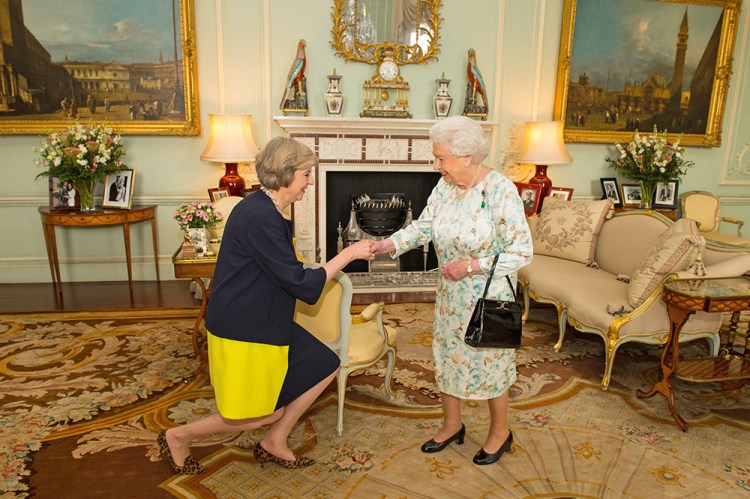LONDON – The British government’s decision to invite President Trump for a state visit, one of the highest honors it can bestow on a visiting dignitary, has involved Queen Elizabeth II in the passionate debate over Trump’s travel ban.
Trump’s provocative decision to deny refugees access to the United States and to make it more difficult for people from seven Muslim-majority countries to visit has been widely denounced by opposition leaders and sparked protests in Britain, leading some to question the wisdom of the government’s decision.
It is the British government, currently led by Prime Minister Theresa May, that invites heads of state on the queen’s behalf, but it is the queen who acts as hostess. In most cases, that involves lavish pomp and ceremony, as well as a stay of several days at the queen’s official residence, Buckingham Palace.

Demonstrators hold banners during a protest against U.S President Donald Trump’s controversial travel ban on refugees and people from seven mainly-Muslim countries, in Oxford, England, Monday.
The prospect of protests outside the palace when Trump comes calling has put the queen in a “very difficult position,” said Peter Ricketts, formerly a top official in the Foreign Office.
In a letter to The Times on Tuesday, Ricketts said the “state visit” should be downgraded to a lower level “official visit” to spare the monarch any embarrassment. He said the invitation should not have been extended in the first days of Trump’s administration.
“It would have been far wiser to wait and see what sort of president he would turn out to be before advising the queen to invite him,” Ricketts said.
London Mayor Sadiq Khan, the first Muslim elected to that post, has called for the invitation to be rescinded. His office said he will describe Trump’s travel ban as “cruel, prejudiced and counterproductive” at a City Hall diplomatic reception Tuesday.

President Trump signed an executive order Friday, just after meeting with British Prime Minister Theresa May, halting the U.S. refugee program for 120 days, indefinitely banning all Syrian refugees and suspended issuing visas for people from Iran, Iraq, Libya, Somalia, Sudan, Syria or Yemen for at least 90 days.
State visits are typically offered to foreign monarchs, presidents and prime ministers in ways designed to bolster British diplomacy and economic interests.
The invitation to Trump is part of an effort to strengthen ties with the goal of reaching a beneficial trade agreement with the United States once Britain leaves the European Union.
A state visit is a carefully choreographed event and involves grand pageantry in the heart of London.
The queen and other senior royals greet visitors with a ceremonial welcome, usually on Horse Guards Parade, followed by a carriage procession to the palace. A multi-gun salute is fired from Green Park and the Tower of London, and there traditionally is a formal banquet for roughly 150 guests in the palace ballroom.
The queen opens the state dinner with a speech, followed by a formal toast to her guest.
Buckingham Palace officials said the queen would not comment on plans for Trump’s visit. The government says the visit is “months away” and that a date has not been chosen.
May said during a joint appearance with Trump Friday that he would be coming for a state visit at an unspecified date.
Hours later, Trump signed the executive order limiting travel to the United States. May has said she does not agree with the plan, but the government insists the state visit is going forward.
Send questions/comments to the editors.


